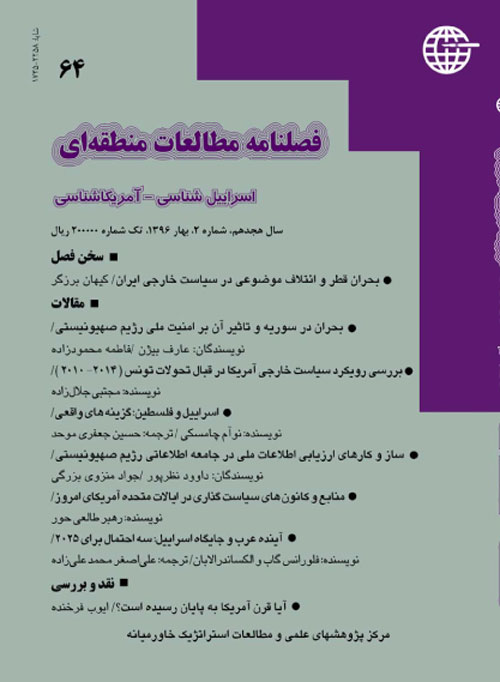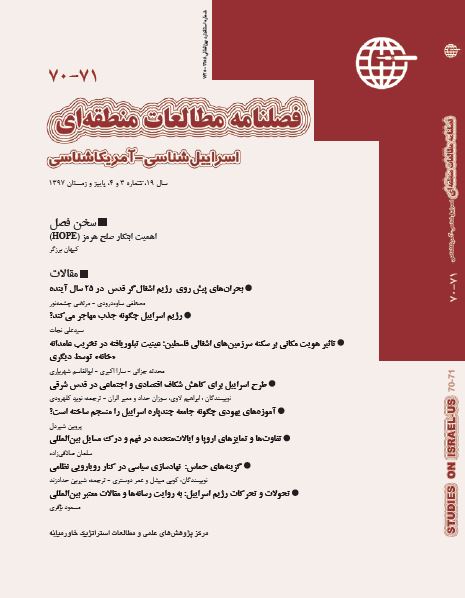فهرست مطالب

نشریه مطالعات منطقه ای
سال هجدهم شماره 2 (بهار 1396)
- اسراییل شناسی - آمریکا شناسی
- بهای روی جلد: 200,000ريال
- تاریخ انتشار: 1397/02/25
- تعداد عناوین: 8
- سخن فصل
- مقالات
- نقد و بررسی
-
صفحه 171
-
Page 1Since its foundation in 1948, the Israeli regime has always sought to weaken
neighboring countries for attaining security by using a military option. In addition to
forced nature of this country, it is located in the strategic Middle East region, and its
neighbors, such as Syria, which are now in conflict and internal crisis, have been
threatened Israeli national security. This article is intended to examine the national
security of Israel and the effects that the Syrian crisis can have on the national security
of Israel. Also, with the assumption that Syria and Israel have a common border and
differences in the Golan Heights can affect each other's security, are seeking to answer
the question of how the domestic crisis in Syria can affect national security of the
Zionist regime.Keywords: Syria, Israel, National Security, Jordan River, Gaza, Settlement, Geopolitics -
Page 33The invasive foreign policy of the Neo-Conservatives in the Middle East and North
Africa, which the invasion of Iraq and Afghanistan, has been manifestation of it, and
the adoption of a policy of unilateralism against its allies has led to a decline in the
strength and depth of American influence in the region and the cost of this country
Keep up to date. After Barack Obama get into power, fundamental changes have taken
place in the country's foreign policy, especially in the Middle East and North Africa,
which has led to significant changes in the definition of power and its application to
popular movements. Remarkable developments in the Middle East, which began in
2010 with the unrest in Tunisia and Egypt, began to spark a turning point in the use of
the new US foreign policy strategy. The present paper, by examining US foreign policy
towards the Tunisian evolution and movement, has attempted to demonstrate the extent of the America's use of smart power and its components to manage and control these developments as well as the implementation of guiding democracy in accordance with the Western model.Keywords: foreign policy, America', Obama, Tunisia, Arab spring -
Page 57Chomsky, as a sensitive intellectual on the issues of the day, has always monitored the
movements of Israel's Zionist regime and has repeatedly spoken about it. It is
Chomsky's concern that what Israel will do with the Palestinians at the end and how it
will form a composite military unit of the two nations. In this article, he criticized
Israel's policies on immigration, settlements and barrier wall, which is of particular
interest.Keywords: One state- One Nation, Settlement, barrier wall, process of peace, comprehension of threat -
Page 69Assessing national intelligence has a significant and determinant role in defining the
goals and policies of countries in the domestic and international arenas. Consequently,
many countries have sought to prioritize and provide policy-makers with a range of
policies, assessments, and estimates of the aspects and dimensions of different political,
security, social, economic and cultural developments. This essay first explores the
intelligence community of the Zionist regime and the responsibilities of its member
organizations. Then, the process of evaluating, collecting and presenting national
intelligence in the intelligence community of the Zionist regime have been examined. In
this regard, the authors, while using the descriptive, analytical and library resources, by
comparing the methods of assessing the national intelligence of the Zionist regime with
the United States and United Kingdom, conclude that active organizations in the
intelligence community of the Zionist regime present their evaluations to the head of
government and the prime minister separately and directly. Meanwhile, in countries
such as the United States and the United Kingdom, intelligence agencies are set up by
their government chiefs to take responsibility for the compilation of national
intelligence assessments.Keywords: National Intelligence Assessment, Mechanisms, Zionist Regime, Intelligence Community -
Page 91Over the past half century, the United States has championed its supremacy as a supreme power, despite the controversy and special events that have occurred in international community, which, in addition to considering its ability, recognizes prevalent policies of the United States. The design and implementation of foreign policy in each country is the responsibility of the individuals and groups that in the analysis of foreign policy of that country. After the Second World War, the United States has had the most powerful and most influential foreign policy in the world, as the supreme power of the international community, influenced by its political, economic and military capabilities, and directly or indirectly in the face of it in most parts of the world. And this extensive presence requires a strong diplomacy and foreign policy instrument that attempts to examine the elements and resources that have contributed to the formation of such a foreign policy.Keywords: United States of America, foreign policy, formal institutions, informal institutions
-
Page 121How will the future be? The answer to this question is complex and includes a wide
range of probabilities. Well, bad or a combination of both but more than anything else
will surprise us. When we expect the future, hope is not the most logical thing to
influence our decision: science and knowledge are the main prerequisites for
minimizing strategic surprise, but nevertheless our world will remain a place full of
uncertainty. Political decisions have a positive and timely impact, and the efforts of the
European Institute for Security Studies help to make the right decisions. In this paper,
three possible scenarios for the future of Arab world are described, all of which depend
entirely on the decisions of the policy makers. Apart from things that we cannot change,
such as climate change or definite realities such as population growth. With this in
mind, the report of the European Union Institute for Security Studies seeks to send a
promising message. As It will see, while the better future in the Middle East and North
Africa is not necessarily a fortnight, the future may well be closed to getting the right
decisions right now. On the other hand, even the best currencies can be mistaken, as
.well as the policies taken to repel future (s)


